- Home
- Alexandre Dumas
La tulipe noire. English
La tulipe noire. English Read online
Produced by An Anonymous Volunteer
THE BLACK TULIP
By Alexandre Dumas (Pere)
Chapter 1. A Grateful People
On the 20th of August, 1672, the city of the Hague, always so lively,so neat, and so trim that one might believe every day to be Sunday, withits shady park, with its tall trees, spreading over its Gothic houses,with its canals like large mirrors, in which its steeples and its almostEastern cupolas are reflected,--the city of the Hague, the capital ofthe Seven United Provinces, was swelling in all its arteries with ablack and red stream of hurried, panting, and restless citizens, who,with their knives in their girdles, muskets on their shoulders, orsticks in their hands, were pushing on to the Buytenhof, a terribleprison, the grated windows of which are still shown, where, on thecharge of attempted murder preferred against him by the surgeonTyckelaer, Cornelius de Witt, the brother of the Grand Pensionary ofHolland was confined.
If the history of that time, and especially that of the year in themiddle of which our narrative commences, were not indissolubly connectedwith the two names just mentioned, the few explanatory pages which weare about to add might appear quite supererogatory; but we will, fromthe very first, apprise the reader--our old friend, to whom we are wonton the first page to promise amusement, and with whom we always try tokeep our word as well as is in our power--that this explanation is asindispensable to the right understanding of our story as to that of thegreat event itself on which it is based.
Cornelius de Witt, Ruart de Pulten, that is to say, warden of the dikes,ex-burgomaster of Dort, his native town, and member of the Assemblyof the States of Holland, was forty-nine years of age, when the Dutchpeople, tired of the Republic such as John de Witt, the Grand Pensionaryof Holland, understood it, at once conceived a most violent affectionfor the Stadtholderate, which had been abolished for ever in Holland bythe "Perpetual Edict" forced by John de Witt upon the United Provinces.
As it rarely happens that public opinion, in its whimsical flights,does not identify a principle with a man, thus the people saw thepersonification of the Republic in the two stern figures of the brothersDe Witt, those Romans of Holland, spurning to pander to the fanciesof the mob, and wedding themselves with unbending fidelity to libertywithout licentiousness, and prosperity without the waste of superfluity;on the other hand, the Stadtholderate recalled to the popular mind thegrave and thoughtful image of the young Prince William of Orange.
The brothers De Witt humoured Louis XIV., whose moral influence was feltby the whole of Europe, and the pressure of whose material power Hollandhad been made to feel in that marvellous campaign on the Rhine, which,in the space of three months, had laid the power of the United Provincesprostrate.
Louis XIV. had long been the enemy of the Dutch, who insulted orridiculed him to their hearts' content, although it must be said thatthey generally used French refugees for the mouthpiece of their spite.Their national pride held him up as the Mithridates of the Republic.The brothers De Witt, therefore, had to strive against a doubledifficulty,--against the force of national antipathy, and, besides,against the feeling of weariness which is natural to all vanquishedpeople, when they hope that a new chief will be able to save them fromruin and shame.
This new chief, quite ready to appear on the political stage, and tomeasure himself against Louis XIV., however gigantic the fortunes of theGrand Monarch loomed in the future, was William, Prince of Orange, sonof William II., and grandson, by his mother Henrietta Stuart, of CharlesI. of England. We have mentioned him before as the person by whom thepeople expected to see the office of Stadtholder restored.
This young man was, in 1672, twenty-two years of age. John de Witt, whowas his tutor, had brought him up with the view of making him a goodcitizen. Loving his country better than he did his disciple, the masterhad, by the Perpetual Edict, extinguished the hope which the youngPrince might have entertained of one day becoming Stadtholder. But Godlaughs at the presumption of man, who wants to raise and prostrate thepowers on earth without consulting the King above; and the ficklenessand caprice of the Dutch combined with the terror inspired by LouisXIV., in repealing the Perpetual Edict, and re-establishing the officeof Stadtholder in favour of William of Orange, for whom the hand ofProvidence had traced out ulterior destinies on the hidden map of thefuture.
The Grand Pensionary bowed before the will of his fellow citizens;Cornelius de Witt, however, was more obstinate, and notwithstanding allthe threats of death from the Orangist rabble, who besieged him in hishouse at Dort, he stoutly refused to sign the act by which the office ofStadtholder was restored. Moved by the tears and entreaties of his wife,he at last complied, only adding to his signature the two letters V. C.(Vi Coactus), notifying thereby that he only yielded to force.
It was a real miracle that on that day he escaped from the doom intendedfor him.
John de Witt derived no advantage from his ready compliance with thewishes of his fellow citizens. Only a few days after, an attemptwas made to stab him, in which he was severely although not mortallywounded.
This by no means suited the views of the Orange faction. The life ofthe two brothers being a constant obstacle to their plans, they changedtheir tactics, and tried to obtain by calumny what they had not beenable to effect by the aid of the poniard.
How rarely does it happen that, in the right moment, a great man isfound to head the execution of vast and noble designs; and for thatreason, when such a providential concurrence of circumstances doesoccur, history is prompt to record the name of the chosen one, and tohold him up to the admiration of posterity. But when Satan interposesin human affairs to cast a shadow upon some happy existence, or tooverthrow a kingdom, it seldom happens that he does not find at his sidesome miserable tool, in whose ear he has but to whisper a word to sethim at once about his task.
The wretched tool who was at hand to be the agent of this dastardlyplot was one Tyckelaer whom we have already mentioned, a surgeon byprofession.
He lodged an information against Cornelius de Witt, setting forth thatthe warden--who, as he had shown by the letters added to his signature,was fuming at the repeal of the Perpetual Edict--had, from hatredagainst William of Orange, hired an assassin to deliver the new Republicof its new Stadtholder; and he, Tyckelaer was the person thus chosen;but that, horrified at the bare idea of the act which he was asked toperpetrate, he had preferred rather to reveal the crime than to commitit.
This disclosure was, indeed, well calculated to call forth a furiousoutbreak among the Orange faction. The Attorney General caused, on the16th of August, 1672, Cornelius de Witt to be arrested; and the noblebrother of John de Witt had, like the vilest criminal, to undergo, inone of the apartments of the town prison, the preparatory degrees oftorture, by means of which his judges expected to force from him theconfession of his alleged plot against William of Orange.
But Cornelius was not only possessed of a great mind, but also of agreat heart. He belonged to that race of martyrs who, indissolublywedded to their political convictions as their ancestors were to theirfaith, are able to smile on pain: while being stretched on the rack, herecited with a firm voice, and scanning the lines according to measure,the first strophe of the "Justum ac tenacem" of Horace, and, making noconfession, tired not only the strength, but even the fanaticism, of hisexecutioners.
The judges, notwithstanding, acquitted Tyckelaer from every charge; atthe same time sentencing Cornelius to be deposed from all his officesand dignities; to pay all the costs of the trial; and to be banishedfrom the soil of the Republic for ever.
This judgment against not only an innocent, but also a great man,was indeed some gratification to the passions of the people, to whoseinterests Cornelius de Witt had always devoted himself: but, as we shallsoon see, it was not enough.
The Athenians, who indeed have left behind them a pretty tolerablereputation for ingratitude, have in this respect to yield precedence tothe Dutch. They, at least in the case of Aristides, contented themselveswith banishing him.
John de Witt, at the first intimation of the charge brought against hisbrother, had resigned his office of Grand Pensionary. He too receiveda noble recompense for his devotedness to the best interests of hiscountry, taking with him into the retirement of private life thehatred of a host of enemies, and the fresh scars of wounds inflicted byassassins, only too often the sole guerdon obtained by honest people,who are guilty of having worked for their country, and of havingforgotten their own private interests.
In the meanwhile William of Orange urged on the course of events byevery means in his power, eagerly waiting for the time when the people,by whom he was idolised, should have made of the bodies of the brothersthe two steps over which he might ascend to the chair of Stadtholder.
Thus, then, on the 20th of August, 1672, as we have already stated inthe beginning of this chapter, the whole town was crowding towards theBuytenhof, to witness the departure of Cornelius de Witt from prison,as he was going to exile; and to see what traces the torture of the rackhad left on the noble frame of the man who knew his Horace so well.
Yet all this multitude was not crowding to the Buytenhof with theinnocent view of merely feasting their eyes with the spectacle; therewere many who went there to play an active part in it, and to take uponthemselves an office which they conceived had been badly filled,--thatof the executioner.
There were, indeed, others with less hostile intentions. All that theycared for was the spectacle, always so attractive to the mob, whoseinstinctive pride is flattered by it,--the sight of gr
eatness hurleddown into the dust.
"Has not," they would say, "this Cornelius de Witt been locked up andbroken by the rack? Shall we not see him pale, streaming with blood,covered with shame?" And was not this a sweet triumph for the burghersof the Hague, whose envy even beat that of the common rabble; a triumphin which every honest citizen and townsman might be expected to share?
"Moreover," hinted the Orange agitators interspersed through the crowd,whom they hoped to manage like a sharp-edged and at the same timecrushing instrument,--"moreover, will there not, from the Buytenhof tothe gate of the town, a nice little opportunity present itself to throwsome handfuls of dirt, or a few stones, at this Cornelius de Witt, whonot only conferred the dignity of Stadtholder on the Prince of Orangemerely vi coactus, but who also intended to have him assassinated?"
"Besides which," the fierce enemies of France chimed in, "if the workwere done well and bravely at the Hague, Cornelius would certainly notbe allowed to go into exile, where he will renew his intrigues withFrance, and live with his big scoundrel of a brother, John, on the goldof the Marquis de Louvois."
Being in such a temper, people generally will run rather than walk;which was the reason why the inhabitants of the Hague were hurrying sofast towards the Buytenhof.
Honest Tyckelaer, with a heart full of spite and malice, and with noparticular plan settled in his mind, was one of the foremost, beingparaded about by the Orange party like a hero of probity, nationalhonour, and Christian charity.
This daring miscreant detailed, with all the embellishments andflourishes suggested by his base mind and his ruffianly imagination, theattempts which he pretended Cornelius de Witt had made to corrupt him;the sums of money which were promised, and all the diabolical stratagemsplanned beforehand to smooth for him, Tyckelaer, all the difficulties inthe path of murder.
And every phase of his speech, eagerly listened to by the populace,called forth enthusiastic cheers for the Prince of Orange, and groansand imprecations of blind fury against the brothers De Witt.
The mob even began to vent its rage by inveighing against the iniquitousjudges, who had allowed such a detestable criminal as the villainCornelius to get off so cheaply.
Some of the agitators whispered, "He will be off, he will escape fromus!"
Others replied, "A vessel is waiting for him at Schevening, a Frenchcraft. Tyckelaer has seen her."
"Honest Tyckelaer! Hurrah for Tyckelaer!" the mob cried in chorus.
"And let us not forget," a voice exclaimed from the crowd, "that at thesame time with Cornelius his brother John, who is as rascally a traitoras himself, will likewise make his escape."
"And the two rogues will in France make merry with our money, with themoney for our vessels, our arsenals, and our dockyards, which they havesold to Louis XIV."
"Well, then, don't let us allow them to depart!" advised one of thepatriots who had gained the start of the others.
"Forward to the prison, to the prison!" echoed the crowd.
Amid these cries, the citizens ran along faster and faster, cockingtheir muskets, brandishing their hatchets, and looking death anddefiance in all directions.
No violence, however, had as yet been committed; and the file ofhorsemen who were guarding the approaches of the Buytenhof remainedcool, unmoved, silent, much more threatening in their impassibility thanall this crowd of burghers, with their cries, their agitation, and theirthreats. The men on their horses, indeed, stood like so many statues,under the eye of their chief, Count Tilly, the captain of the mountedtroops of the Hague, who had his sword drawn, but held it with its pointdownwards, in a line with the straps of his stirrup.
This troop, the only defence of the prison, overawed by its firmattitude not only the disorderly riotous mass of the populace, but alsothe detachment of the burgher guard, which, being placed opposite theBuytenhof to support the soldiers in keeping order, gave to the riotersthe example of seditious cries, shouting,--
"Hurrah for Orange! Down with the traitors!"
The presence of Tilly and his horsemen, indeed, exercised a salutarycheck on these civic warriors; but by degrees they waxed more and moreangry by their own shouts, and as they were not able to understand howany one could have courage without showing it by cries, they attributedthe silence of the dragoons to pusillanimity, and advanced one steptowards the prison, with all the turbulent mob following in their wake.
In this moment, Count Tilly rode forth towards them single-handed,merely lifting his sword and contracting his brow whilst he addressedthem:--
"Well, gentlemen of the burgher guard, what are you advancing for, andwhat do you wish?"
The burghers shook their muskets, repeating their cry,--
"Hurrah for Orange! Death to the traitors!"
"'Hurrah for Orange!' all well and good!" replied Tilly, "although Icertainly am more partial to happy faces than to gloomy ones. 'Deathto the traitors!' as much of it as you like, as long as you show yourwishes only by cries. But, as to putting them to death in good earnest,I am here to prevent that, and I shall prevent it."
Then, turning round to his men, he gave the word of command,--
"Soldiers, ready!"
The troopers obeyed orders with a precision which immediately causedthe burgher guard and the people to fall back, in a degree of confusionwhich excited the smile of the cavalry officer.
"Holloa!" he exclaimed, with that bantering tone which is peculiar tomen of his profession; "be easy, gentlemen, my soldiers will not fire ashot; but, on the other hand, you will not advance by one step towardsthe prison."
"And do you know, sir, that we have muskets?" roared the commandant ofthe burghers.
"I must know it, by Jove, you have made them glitter enough before myeyes; but I beg you to observe also that we on our side have pistols,that the pistol carries admirably to a distance of fifty yards, and thatyou are only twenty-five from us."
"Death to the traitors!" cried the exasperated burghers.
"Go along with you," growled the officer, "you always cry the same thingover again. It is very tiresome."
With this, he took his post at the head of his troops, whilst the tumultgrew fiercer and fiercer about the Buytenhof.
And yet the fuming crowd did not know that, at that very moment whenthey were tracking the scent of one of their victims, the other, asif hurrying to meet his fate, passed, at a distance of not more than ahundred yards, behind the groups of people and the dragoons, to betakehimself to the Buytenhof.
John de Witt, indeed, had alighted from his coach with his servant, andquietly walked across the courtyard of the prison.
Mentioning his name to the turnkey, who however knew him, he said,--
"Good morning, Gryphus; I am coming to take away my brother, who, as youknow, is condemned to exile, and to carry him out of the town."
Whereupon the jailer, a sort of bear, trained to lock and unlock thegates of the prison, had greeted him and admitted him into the building,the doors of which were immediately closed again.
Ten yards farther on, John de Witt met a lovely young girl, of aboutseventeen or eighteen, dressed in the national costume of the Frisianwomen, who, with pretty demureness, dropped a curtesy to him. Chuckingher under the chin, he said to her,--
"Good morning, my good and fair Rosa; how is my brother?"
"Oh, Mynheer John!" the young girl replied, "I am not afraid of the harmwhich has been done to him. That's all over now."
"But what is it you are afraid of?"
"I am afraid of the harm which they are going to do to him."
"Oh, yes," said De Witt, "you mean to speak of the people down below,don't you?"
"Do you hear them?"
"They are indeed in a state of great excitement; but when they see usperhaps they will grow calmer, as we have never done them anything butgood."
"That's unfortunately no reason, except for the contrary," muttered thegirl, as, on an imperative sign from her father, she withdrew.
"Indeed, child, what you say is only too true."
Then, in pursuing his way, he said to himself,--
"Here is a damsel who very likely does not know how to read, whoconsequently has never read anything, and yet with one word she has justtold the whole history of the world."
And with the same calm mien, but more melancholy than he had been onentering the prison, the Grand Pensionary proceeded towards the cell ofhis brother.

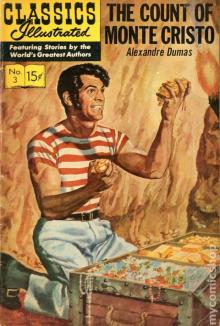 The Count of Monte Cristo, Illustrated
The Count of Monte Cristo, Illustrated Knight of Maison-Rouge
Knight of Maison-Rouge![The Three Musketeers - Alexandre Dumas - [Full Version] - (ANNOTATED) Read online](http://i1.bookreadfree.com/14/the_three_musketeers_-_alexandre_dumas_-_[full_version]_-_annotated_preview.jpg) The Three Musketeers - Alexandre Dumas - [Full Version] - (ANNOTATED)
The Three Musketeers - Alexandre Dumas - [Full Version] - (ANNOTATED)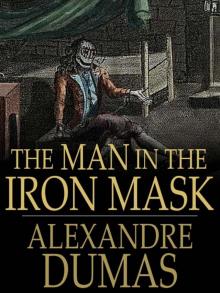 The Man in the Iron Mask
The Man in the Iron Mask The Count of Monte Cristo (Penguin Classics eBook)
The Count of Monte Cristo (Penguin Classics eBook)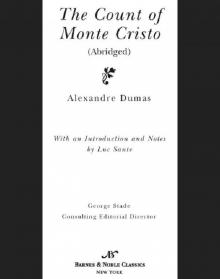 Count of Monte Cristo (abridged) (Barnes & Noble Classics Series)
Count of Monte Cristo (abridged) (Barnes & Noble Classics Series) The Women's War
The Women's War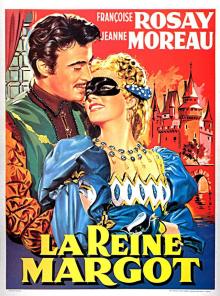 La reine Margot. English
La reine Margot. English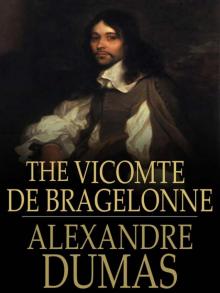 The Vicomte de Bragelonne
The Vicomte de Bragelonne__english_preview.jpg) La dame aux camélias (Novel). English
La dame aux camélias (Novel). English The Count of Monte Cristo
The Count of Monte Cristo Balsamo, the Magician; or, The Memoirs of a Physician
Balsamo, the Magician; or, The Memoirs of a Physician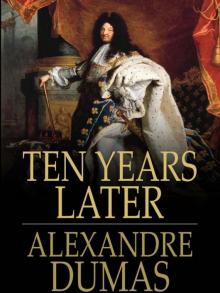 Ten Years Later
Ten Years Later The Romance of Violette
The Romance of Violette The Mesmerist's Victim
The Mesmerist's Victim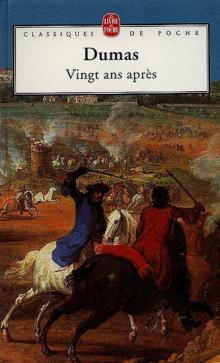 Vingt ans après. English
Vingt ans après. English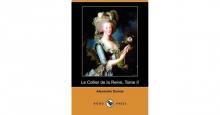 Le collier de la reine. English
Le collier de la reine. English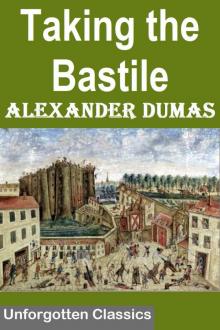 Taking the Bastile; Or, Pitou the Peasant
Taking the Bastile; Or, Pitou the Peasant The Hero of the People: A Historical Romance of Love, Liberty and Loyalty
The Hero of the People: A Historical Romance of Love, Liberty and Loyalty Louise de la Valliere
Louise de la Valliere Les Quarante-cinq. English
Les Quarante-cinq. English Ange Pitou (Volume 1)
Ange Pitou (Volume 1) The Royal Life Guard; or, the flight of the royal family.
The Royal Life Guard; or, the flight of the royal family.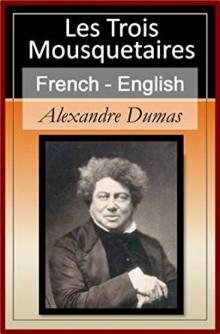 Les trois mousquetaires. English
Les trois mousquetaires. English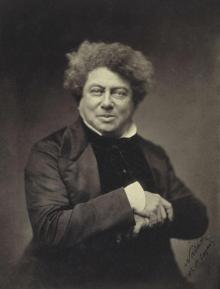 Une fille du régent. English
Une fille du régent. English The Knight of Maison-Rouge
The Knight of Maison-Rouge The Count of Monte Cristo (Unabridged Penguin)
The Count of Monte Cristo (Unabridged Penguin) Ange Pitou
Ange Pitou The Romance of Violette (vintage erotica)
The Romance of Violette (vintage erotica)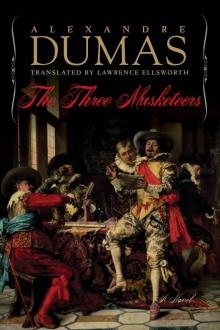 The Three Musketeers
The Three Musketeers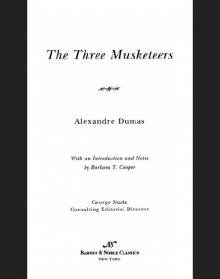 Three Musketeers (Barnes & Noble Classics Series)
Three Musketeers (Barnes & Noble Classics Series) Georges
Georges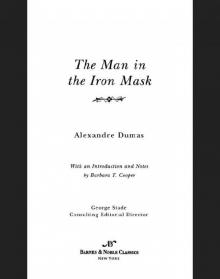 Man in the Iron Mask (Barnes & Noble Classics Series)
Man in the Iron Mask (Barnes & Noble Classics Series)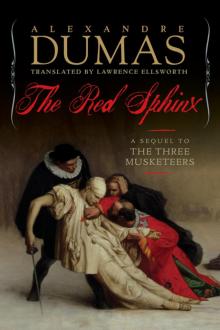 The Red Sphinx
The Red Sphinx